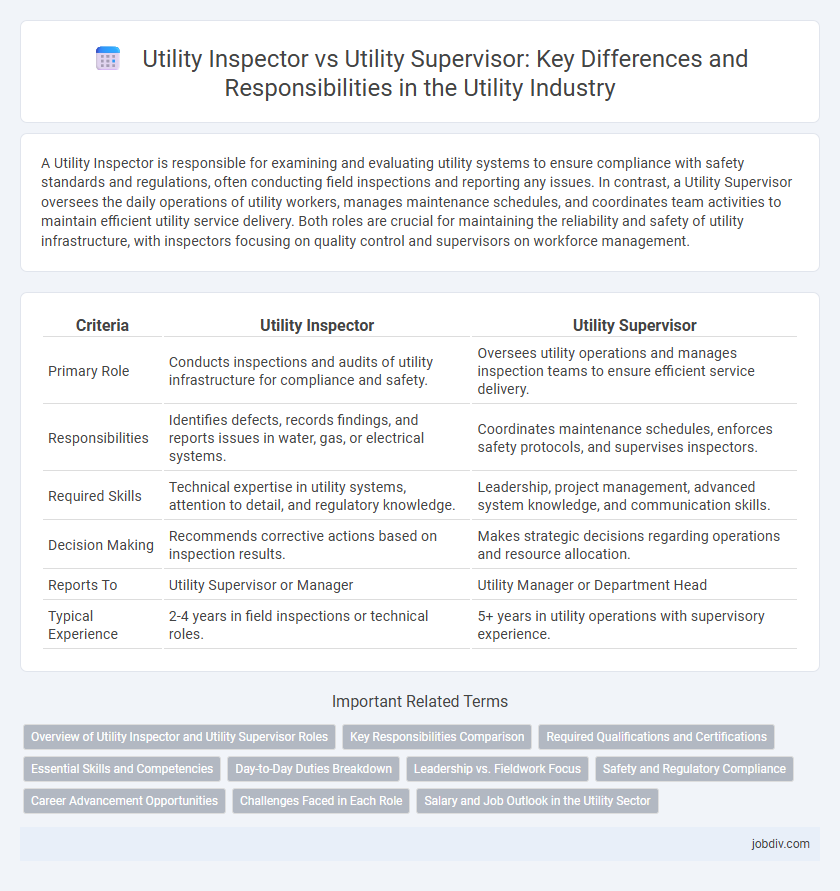A Utility Inspector is responsible for examining and evaluating utility systems to ensure compliance with safety standards and regulations, often conducting field inspections and reporting any issues. In contrast, a Utility Supervisor oversees the daily operations of utility workers, manages maintenance schedules, and coordinates team activities to maintain efficient utility service delivery. Both roles are crucial for maintaining the reliability and safety of utility infrastructure, with inspectors focusing on quality control and supervisors on workforce management.
Table of Comparison
| Criteria | Utility Inspector | Utility Supervisor |
|---|---|---|
| Primary Role | Conducts inspections and audits of utility infrastructure for compliance and safety. | Oversees utility operations and manages inspection teams to ensure efficient service delivery. |
| Responsibilities | Identifies defects, records findings, and reports issues in water, gas, or electrical systems. | Coordinates maintenance schedules, enforces safety protocols, and supervises inspectors. |
| Required Skills | Technical expertise in utility systems, attention to detail, and regulatory knowledge. | Leadership, project management, advanced system knowledge, and communication skills. |
| Decision Making | Recommends corrective actions based on inspection results. | Makes strategic decisions regarding operations and resource allocation. |
| Reports To | Utility Supervisor or Manager | Utility Manager or Department Head |
| Typical Experience | 2-4 years in field inspections or technical roles. | 5+ years in utility operations with supervisory experience. |
Overview of Utility Inspector and Utility Supervisor Roles
Utility Inspectors are responsible for examining utility systems, such as water, gas, and electricity networks, to ensure compliance with safety regulations and operational standards. Utility Supervisors oversee the daily operations of utility crews, coordinate maintenance activities, and implement project plans to maintain efficient service delivery. Both roles play critical parts in maintaining infrastructure integrity and public safety within utility management.
Key Responsibilities Comparison
Utility Inspectors are primarily responsible for examining utility installations, ensuring compliance with safety standards, and identifying infrastructure defects. Utility Supervisors oversee the operational workforce, coordinate maintenance schedules, and manage resource allocation to maintain system efficiency. The Inspector's role emphasizes detailed site assessments and reporting, while the Supervisor focuses on team leadership and workflow management within utility services.
Required Qualifications and Certifications
Utility Inspectors typically require a high school diploma or equivalent, with preferred certifications including OSHA safety training and relevant trade licenses. Utility Supervisors often need a bachelor's degree in engineering, construction management, or a related field, alongside advanced certifications such as PMP (Project Management Professional) or NICET (National Institute for Certification in Engineering Technologies). Both roles benefit from specialized knowledge in utility regulations, safety standards, and technical inspection procedures to ensure compliance and operational efficiency.
Essential Skills and Competencies
Utility Inspectors require strong analytical skills and attention to detail to accurately assess infrastructure conditions and ensure compliance with safety regulations. Utility Supervisors must demonstrate leadership abilities, problem-solving skills, and effective communication to manage teams and coordinate maintenance operations efficiently. Both roles demand proficiency in regulatory knowledge, technical expertise, and the ability to interpret utility system data for optimal performance.
Day-to-Day Duties Breakdown
Utility Inspectors primarily conduct detailed inspections of utility installations, ensuring compliance with safety regulations, identifying faults, and documenting findings for maintenance teams. Utility Supervisors oversee daily field operations, coordinate utility crews, manage schedules, and address escalating issues to maintain efficient service delivery. The Inspector's role is more focused on assessment and reporting, while the Supervisor handles team management and operational decision-making.
Leadership vs. Fieldwork Focus
Utility Inspectors primarily concentrate on fieldwork, conducting on-site inspections to ensure compliance with safety regulations and operational standards within utility infrastructures such as water, gas, and electric systems. Utility Supervisors emphasize leadership responsibilities, managing teams, coordinating maintenance schedules, and overseeing field operations to optimize efficiency and safety. The distinct roles balance technical expertise in the field with strategic oversight and personnel management.
Safety and Regulatory Compliance
Utility Inspectors ensure safety and regulatory compliance by conducting detailed inspections of utility infrastructures, identifying potential hazards, and enforcing adherence to local and federal safety standards. Utility Supervisors oversee field teams, implement safety protocols, and coordinate corrective actions based on inspectors' reports to maintain regulatory compliance throughout utility operations. Both roles are critical in preventing accidents and ensuring utilities operate within established legal and safety frameworks.
Career Advancement Opportunities
Utility Inspectors oversee compliance with safety regulations and infrastructure standards, serving as frontline evaluators for operational integrity. Utility Supervisors manage teams and coordinate maintenance projects, leveraging leadership skills to ensure efficient utility service delivery. Transitioning from Inspector to Supervisor enables career advancement through increased responsibility, higher salary potential, and opportunities for strategic decision-making within the utility sector.
Challenges Faced in Each Role
Utility Inspectors face challenges such as ensuring regulatory compliance, identifying infrastructure faults, and managing safety risks in often hazardous environments. Utility Supervisors encounter complexities in coordinating teams, overseeing project timelines, and handling emergency responses while maintaining operational efficiency. Both roles require balancing technical expertise with proactive problem-solving to minimize service disruptions.
Salary and Job Outlook in the Utility Sector
Utility Inspectors typically earn an average salary ranging from $50,000 to $70,000 annually, while Utility Supervisors command higher salaries, often between $70,000 and $90,000 due to increased responsibilities. The job outlook for Utility Supervisors is generally more favorable, with faster growth projected as supervisory roles expand to manage complex utility operations. Demand for Utility Inspectors remains steady, driven by regulatory compliance and maintenance needs within the utility sector.
Utility Inspector vs Utility Supervisor Infographic

 jobdiv.com
jobdiv.com